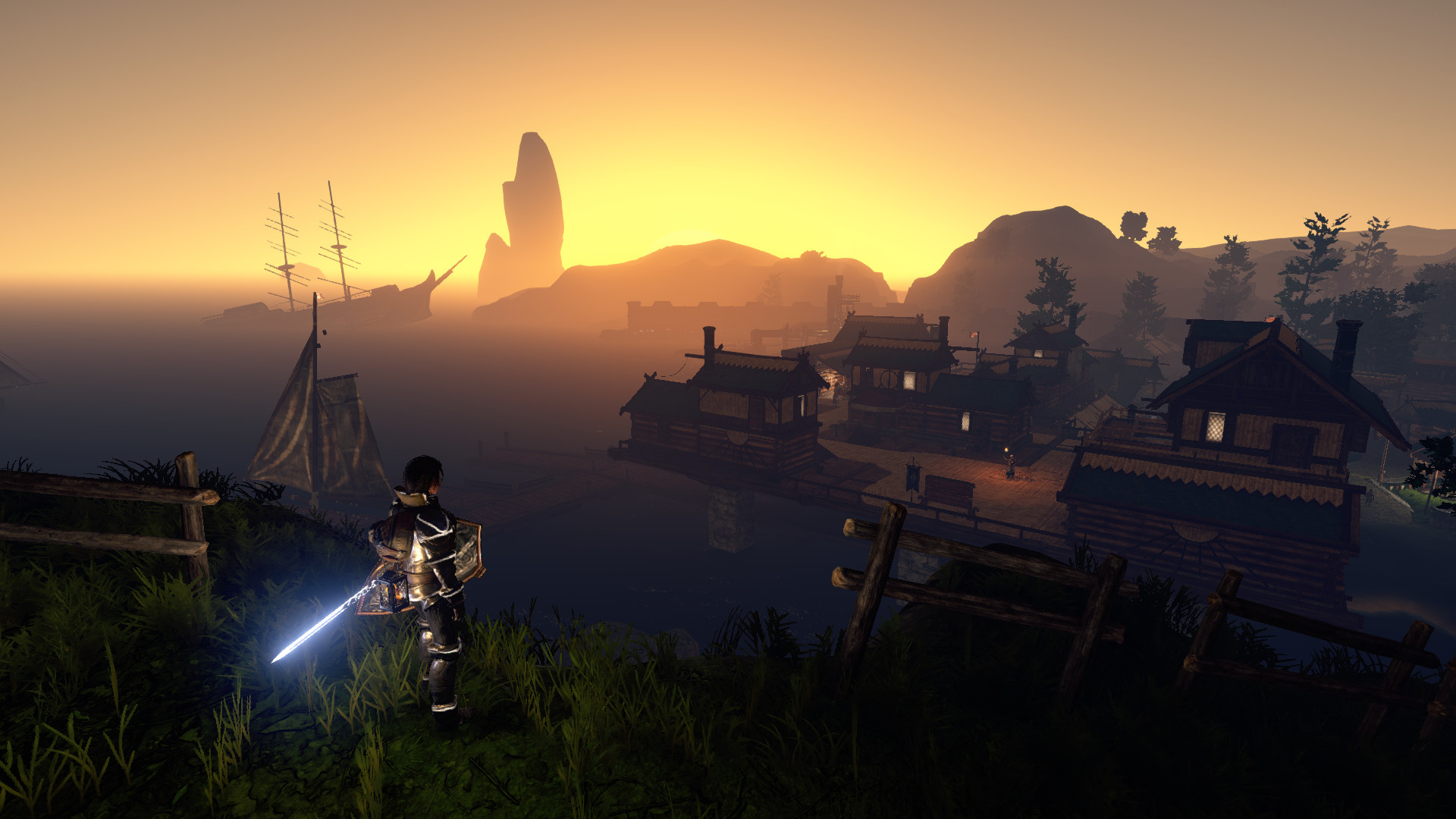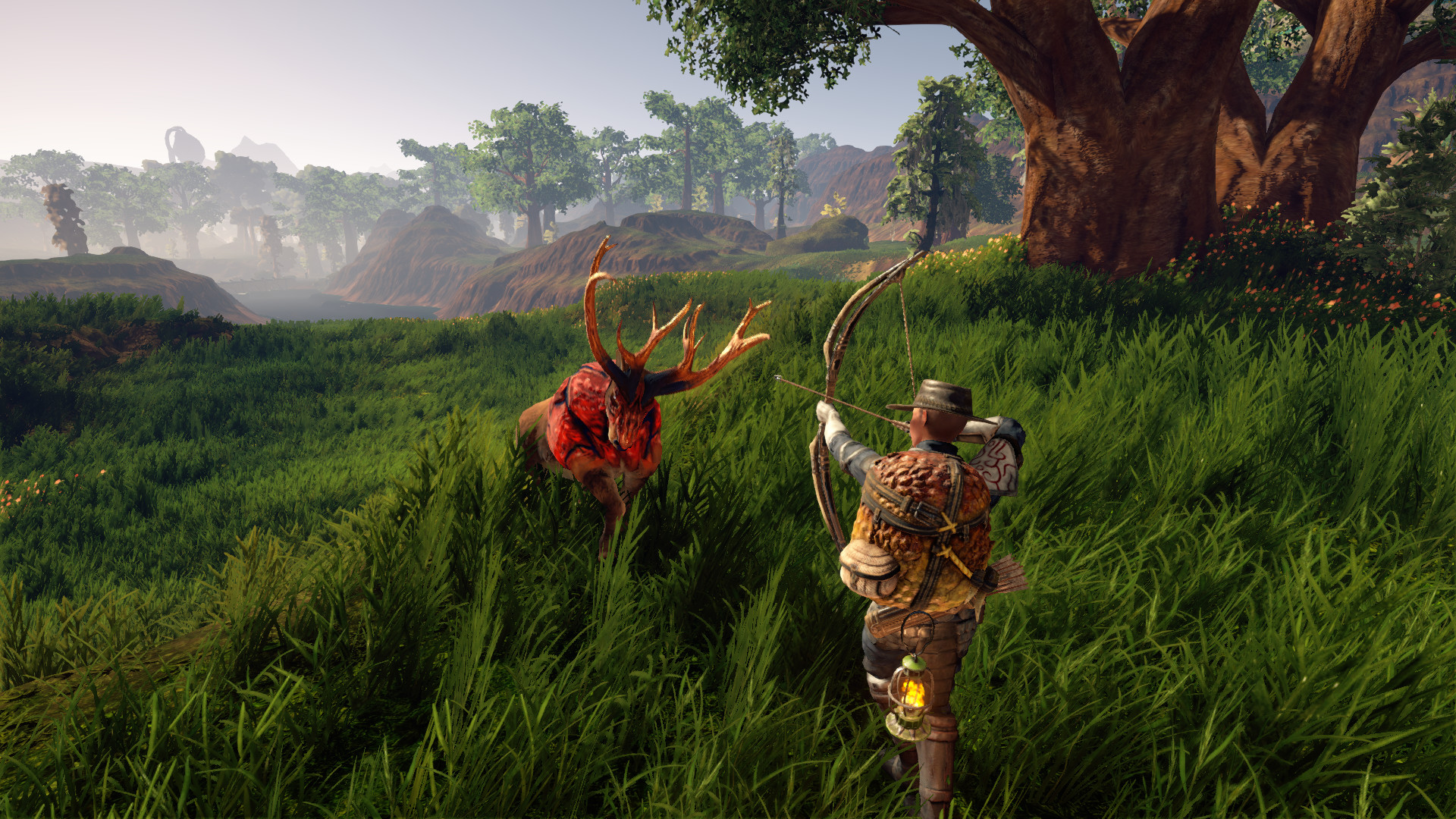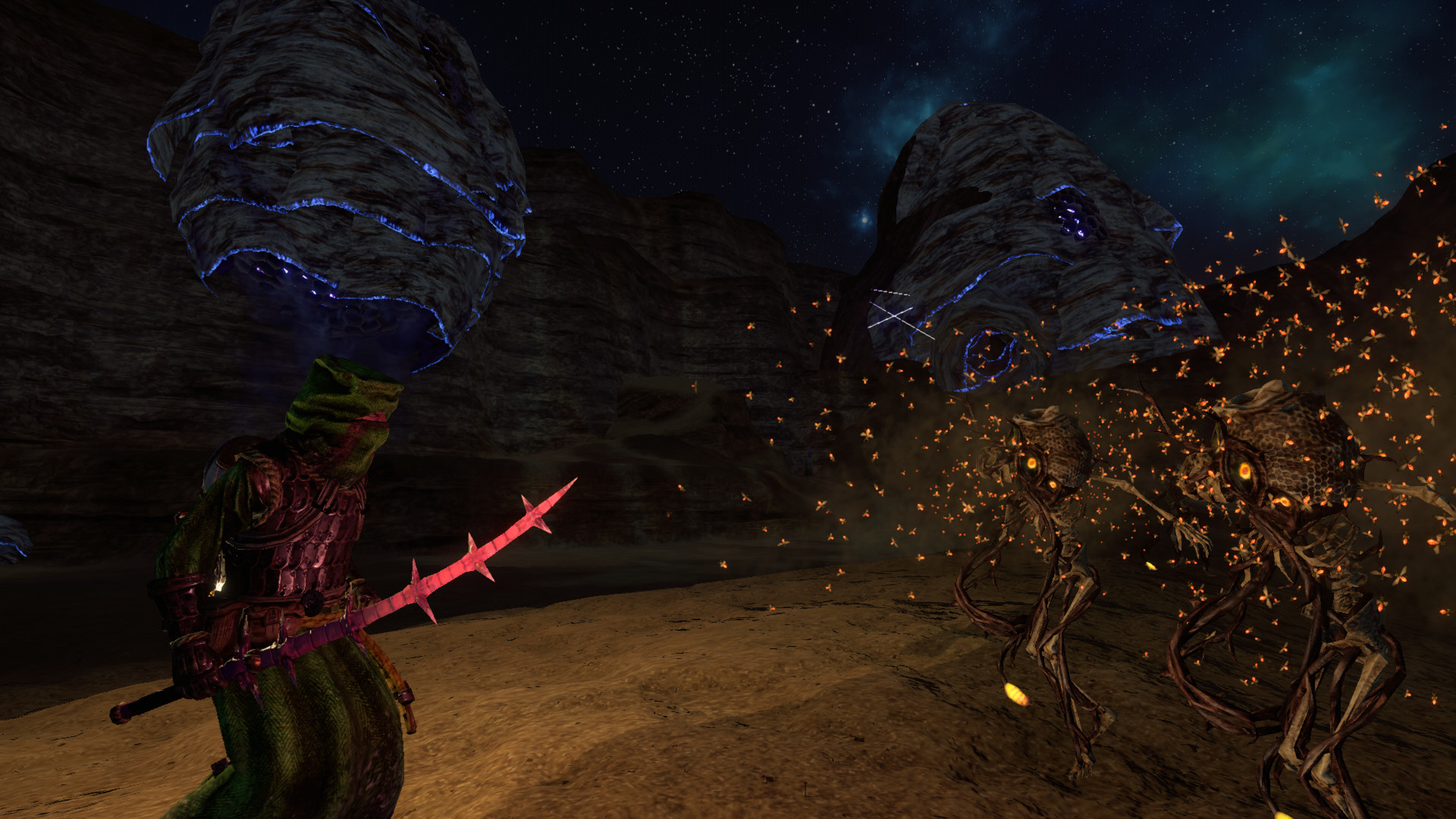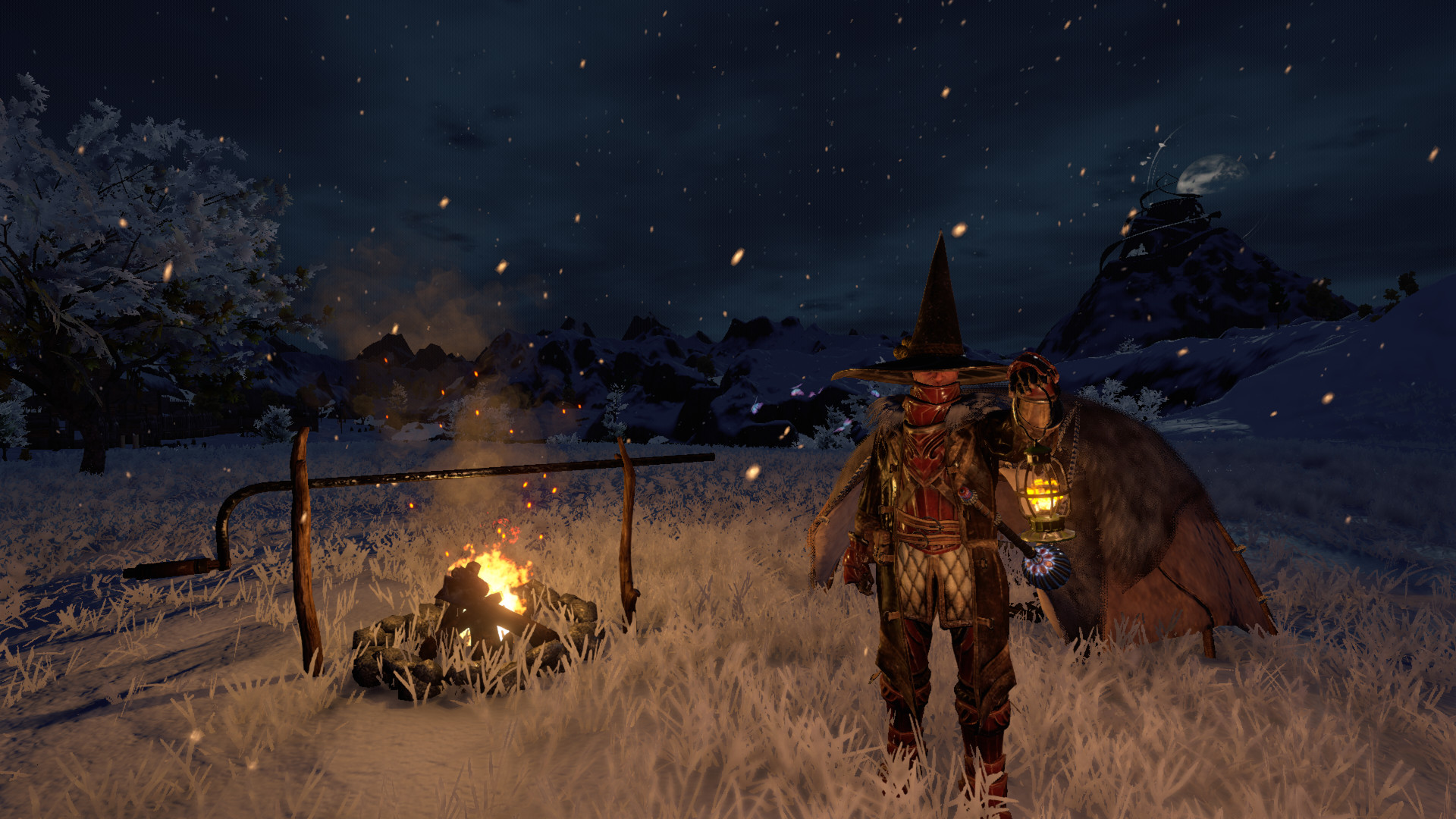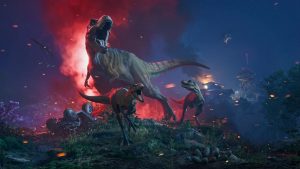
Upcoming open world RPG Outward is a very ambitious game, no matter how you look at it. Though it’s being made by a pretty small development team, it’s looking to deliver a large world ripe for exploration with several interlinking systems and mechanics in place, all with the promise of splitscreen co-op gameplay- something that has become increasingly rare in the current market in general, but especially unheard of in RPGs of larger scales. Curious as we were about the upcoming title, we sent across some of our questions about the game to developers Nine Dots Studio- the following questions were answered by Guillaume Boucher-Vidal, CEO of Nine Dots Studio and creative lead on Outward.
"Outward is an RPG first. Survival mechanics are meant to supplement the experience to make you feel human. Our goal isn’t to make a game about a constant fight against starvation."
How emphasized are the survival mechanics in the game?
Outward is an RPG first. Survival mechanics are meant to supplement the experience to make you feel human. Our goal isn’t to make a game about a constant fight against starvation. A game day lasts about an hour, during which the player needs essentially two meals per day, and it is easy to plan multiple meals ahead. We feel that we struck a good balance to make sure it is neither irrelevant nor tedious.
Can you elaborate on how the online elements of Outward work?
The host player can invite a friend to jump into his world to assist him. The joining player can either create a new player or load a character from his/her own saved games. All character progress is saved for both players, but only the host player’s story progression is saved.
What exactly do the dynamic defeat scenarios in Outward entail?
When the player is defeated, there is a variety of different scenarios that can happen depending on the area where the player was defeated and which type of enemy was the closest when they were defeated. Scenarios can be very simple, such as a slide explaining you were found by a passing hunter and brought back to the nearest town, or can be elaborate, such as being captured as a slave by bandits. Where the player respawns and in which condition varies greatly, and it sometimes can even be beneficial. Whenever the players are KOed, we want them to nervously ask themselves “Oh, what will happen to me this time?”
Spellcasting in Outward seems to be centred on step-by-step approach- can you talk to us about what exactly this entails, and how it’ll function?
Every important spell require some pre-requisite to be met, usually implying a step by step setup before the final delivery. For instance, to cast a rune spell, the player must equip the appropriate magical tome called a Lexicon, and cast the correct runes in the right order. Another example would be a fire sigil, which requires you to expand a firestone to place a magic circle on the floor, and then casting a spark while standing in that magic circle to be able to cast a fireball. Everything feels more involved that way, and it leads to exploration in how to cast those spells and how to efficiently pull them off in a fight.
In fact, even melee special skills follow that formula, requiring from the player some specific conditions such as being under an enraged status or a focus status to do skills such as the Predator Leap or the Precise Strike. The key to win in Outward is preparation, and our skills reflect that.
"We made a game that is intentionally out of our scope because it’s all part of our vision."
You have a pretty small team at Nine Dots Studio, especially for a game as large and ambitious as Outward seems to be- can you talk to us about how you and the rest of the team are handling development of the project? Is a project of this scope a heavy undertaking for a smaller team, or do you feel you’re perfectly equipped to take it on?
We made a game that is intentionally out of our scope because it’s all part of our vision. Nine Dots was founded on the principle that healthier management of game developers such as giving more autonomy, avoiding crunch time, spending more time in pre-production and avoiding wasting time on unused assets, would result in not only happier developers, but more productive as well.
In a way, we have something to prove to the whole industry, and this is why we make games that are “over ambitious”. We want people claiming that crunch is necessary to use us as demonstration that it’s not true. We’re trying to send a message, and we’re also making a dream project while we’re at it. Of course, being a much smaller team means that we must make compromises, and we’re not trying to make a game devoid of flaws. We’re focusing on making something unique, rather than trying to be perfect, as it is the best way to use what resources we have.
Split screen co-op is something that we see less and less of in games these days, so people are quite excited about its inclusion in Outward, especially given its nature as an exploration heavy open world RPG. What was the thought behind the decision to include such a feature in the game?
I have such fond memories of player games in splitscreen with friends or with my brother, and I thoroughly enjoy playing games with my wife as well. That’s how she discovered that she loved shooters, because we went through Gears of War and Army of Two together. I spent so much time playing Skyrim and Oblivion and I simply wished that was an experience I could share with her sometimes, and I knew I wasn’t the only one who wanted a game like that.
Truth be told, the inclusion of split screen in Outward was an extremely difficult challenge, both from a design and technical perspective. We had to make heavy sacrifices to make it work. Making it happen in our game made us understand why it was so rare nowadays, but that’s exactly why we should be doing it. Games need to offer something unique to distinguish themselves from the rest on the market.
How much of an emphasis does Outward put on a set narrative and storytelling?
Outward has three different storylines and we feel that those stories have something to say. It’s not just an excuse to go from point A to point B, and we tried to steer away from clichés. However, we’re not well equipped as a studio to do high budget narrative delivery. There is no lip sync or elaborate cutscenes, which makes it hard to present that story through trailers or other promotional assets. So we had to focus on substance. We touch themes of collectivity versus individualism, religion and faith, inequality of aptitude, among others. We also offer multiple perspectives on the conflicts through the various factions you can join.
Still, the game offers a lot of freedom and ultimately, it’s the player who will decide how much importance the story will have for them.
Do player choices impact the story and the world? If so, how big of an impact are we looking at?
The player can affect the story and the world in two ways: choices and failures. It is one thing to make a choice that can have consequences, but not a lot of games ask of the player to accept their failures and move on. When the player is handed a task, that task is more often than not tied to a time limit. The whole world isn’t waiting for you to get a move on. As for the nature of those consequences, I don’t want to spoil it but I can tell you this much: in a few cases they can be catastrophic in nature.
"Outward is meant to make you think like an adventurer would. We want the players to be scared of enemies and feel the need to prepare accordingly before heading into danger."
Is Outward an experience that is geared specifically for those who enjoy a challenging experience, or does it make concessions to be more accessible to other kinds of players as well?
Outward is meant to make you think like an adventurer would. We want the players to be scared of enemies and feel the need to prepare accordingly before heading into danger. It simply wouldn’t make sense to make the game more accessible, it goes against the vision. However, if the player takes to heart the basic concepts of the game, such as trying to outsmart your enemies instead of rushing in, difficult combat situations can be resolved quickly and efficiently. That bandit is giving you trouble? Poison him and play defensively until he dies. That monster is looking scary? Place some traps before provoking it and consume that special potion you were keeping for a special occasion. Just don’t expect the game to hand things to you on a silver platter.
Do you have any plans for launching on the Switch?
Not at the moment.
Will the game will feature Xbox One X specific enhancements? What can players expect if they are playing the game on Xbox One X? Is 4K/60fps on the cards? And how will the PS4 Pro version turn out in terms of resolution and frame rate?
Both the Xbox One X and PS4 Pro versions will feature improved framerate and higher resolutions. We are also working on other improvements at the moment such as enhanced post processing for both platforms.
How is the game running on the original Xbox One and PS4, frame rate and resolution wise?
Our emphasis in development was focusing on the core experience by providing lean, well optimized builds. Players will not have to worry about having the best hardware available on the market to get the most out of Outward.
Next gen is coming sooner or later. From a development perspective, what is your biggest expectation from PS5 and Xbox Scarlett?
I honestly just want more power, as the PlayStation 4 and Xbox One were already relatively weak when they launched 5 years ago, and the X and Pro are still attached to those weaker consoles since game behavior must stay the same. Higher resolution and higher framerates are a nice bonus, but they do very little to the game experience for most players. If the base console is more powerful, then we can use that power for gameplay instead of only low impact visual adjustments.
This might be irrelevant however if we move toward playing games on the cloud and relying on a fast internet connection instead of powerful hardware. This could be much more disruptive than anything else the gaming industry has faced during the last 5 years.
"I personally don’t like microtransactions as I feel that they offer little value to the player making those purchases, especially if they are temporary buffs and such. It’s important for any industry to be accountable for their actions and to make a genuine effort to provide something of value to its customers."
Do you think cross platform will be one of the defining features of next-gen consoles?
It could be. While I think it’s nice for players to be able to play together no matter the platform, I predict that this will make big games bigger and leave even less room for the smaller games to find their audience. There can only be so many multiplayer games that are highly active at the same time due to the network effect. If all platforms share the same ecosystem, the number of commercially viable multiplayer games might diminish.
What is your take on the ongoing drama of loot boxes and microtransactions?
I personally don’t like microtransactions as I feel that they offer little value to the player making those purchases, especially if they are temporary buffs and such.
It’s important for any industry to be accountable for their actions and to make a genuine effort to provide something of value to its customers.
I feel that the game industry is pushing its luck recently and if we don’t collectively clean up our act like with did in the past with age rating boards, the government will step in and do it for us. Those decisions will be made by people who are less likely to understand gaming and it worries me.








